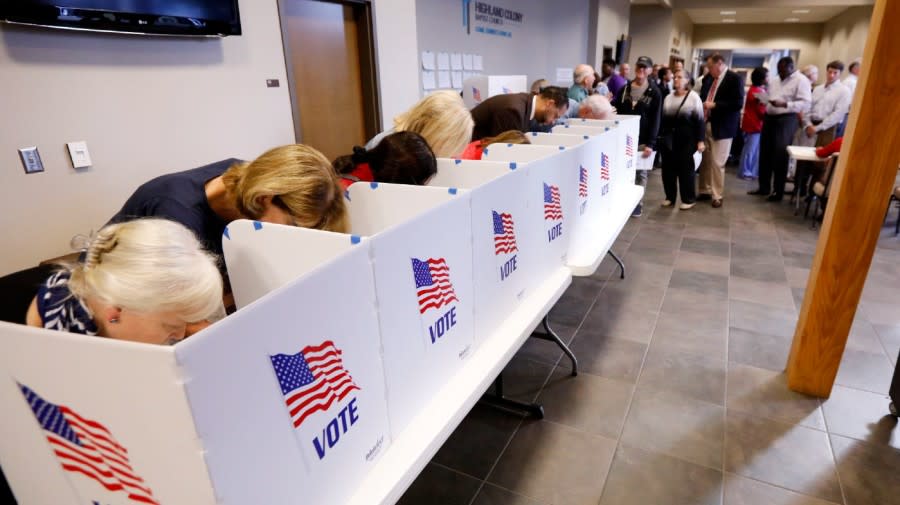How hurdles for transgender voters may affect November’s midterms

Stringent voter identification laws and burdensome policies that make it difficult to change a person’s name or gender on identity documents could keep hundreds of thousands of transgender voters from the polls this November.
In close Senate contests that could determine which party holds the majority next year, suppressing transgender votes may play a role in determining the results, policy analysts warn.
More than 200,000 transgender Americans in 35 states face barriers to voting in the midterm elections next month because of restrictive voter ID laws, a recent Williams Institute report found.
The strictest of those laws, impacting an estimated 65,000 transgender adults, provide no alternative for voters with inaccurate photo identification.
But transgender people also face unique barriers to changing their name or gender marker on identity documents, including driver’s licenses and birth certificates. In nine states, state law requires that a legal name change request be publicly posted or published, often in a local newspaper.
That opens the door for discrimination and possible harassment that could deter some transgender people from obtaining identity documents necessary for voting in some states.
“We do know that discrimination acts as a deterrent in general,” Logan Casey, a senior LGBTQ policy researcher at the Movement Advancement Project, told The Hill in an interview. “There’s no reason to expect it wouldn’t happen here.”
In a national 2015 survey, more than 30 percent of transgender adults reported being verbally harassed, physically assaulted or denied service when they presented an ID that did not match their gender presentation.
The same survey, conducted by the National Center for Transgender Equality, found that roughly 25 percent of transgender adults in the U.S. were not registered to vote, with 9 percent reporting that potential harassment by election officials, inaccurate identity documents or stringent voter ID laws had stopped them from registering.
Around 8 percent of transgender people who were registered to vote cited the same reasons for not casting a ballot in the previous election.
In two states — Tennessee and Georgia — restrictive policies that require transgender residents to provide proof of gender-affirming surgery, a court order or an amended birth certificate to change their gender designation on state-issued driver’s licenses is compounded with some of the most stringent voter ID laws in the country.
Under Georgia state law, photo identification is required to cast a ballot. If an ID is not presented, a vote may be cast using a provisional ballot, but the voter is required to return to the polling place within three days to show proof of identification. In Tennessee, an ID must be presented within two days of voting.
Similar laws have been adopted by states including Alabama, Kansas, Utah and Wisconsin — all of which have also instituted burdensome and prohibitive requirements that prevent transgender people from obtaining accurate identity documents.
The double barrier to voting that transgender people face will almost certainly impact the outcome of the midterm elections next month, according to Brian Hinkle, a senior voting policy researcher with the Movement Advancement Project.
That’s especially so in states like Georgia, where restrictive policies are coupled with razor-thin margins. More than 49,000 Georgia residents over 18 are transgender, according to a recent Williams Institute estimate, accounting for roughly 0.6 percent of the state’s total adult population.
That figure could be large enough to move the needle either way this November, with Georgia’s Senate race between Sen. Raphael Warnock (D) and Republican Herschel Walker considered a toss-up by election forecasters. President Biden won the state in 2020, but only by around 12,000 votes, while both Georgia Senate races that year went to runoffs.
“If you have these barriers that may impact the trans population, along with populations like people of color, low-income voters and voters with disabilities, those barriers can quickly add up in a state with margins that close,” Hinkle said.
Barriers to voting in Wisconsin could similarly impact the outcome of the state’s toss-up Senate race next month, Hinkle said, with roughly 15,000 transgender adults required to provide accurate photo identification to cast a ballot. Recent polls show Sen. Ron Johnson (R), one of the most vulnerable GOP senators this cycle, with a slight lead over his Democratic opponent, Lt. Gov. Mandela Barnes.
In Utah, where 13,000 transgender adults account for 0.6 percent of the state’s adult population, the Senate race between Sen. Mike Lee (R) and Evan McMullin, an Independent, is emerging as a potential wild card. A recent Deseret News and Hinckley Institute of Politics poll shows Lee leading by just 4 points.
Studies have shown that stringent voter ID laws also disproportionately impact communities of color, creating another barrier to voting for the nearly 600,000 Black, Asian, Latinx and multiracial transgender adults in the U.S., according to the Williams Institute.
Even in states with less restrictive voter ID laws and clear pathways to correct official documents, transgender people of color — particularly transgender women of color — face obstacles to obtaining accurate IDs.
Chanel Riser, a Black transgender woman in Detroit, said white transgender women in the community, while still experiencing barriers to changing their identity documents, have greater access to legal and financial resources that allow them to do so comparatively easily.
Riser said she was able to alter her gender marker and photo on her driver’s license with relative ease thanks to volunteers at her local LGBTQ community center, but described herself as being among the fortunate few.
“I’m just one of those few girls that has had the opportunity to have that changed,” she said. “Everyone has different experiences and different struggles.”
For the latest news, weather, sports, and streaming video, head to The Hill.

